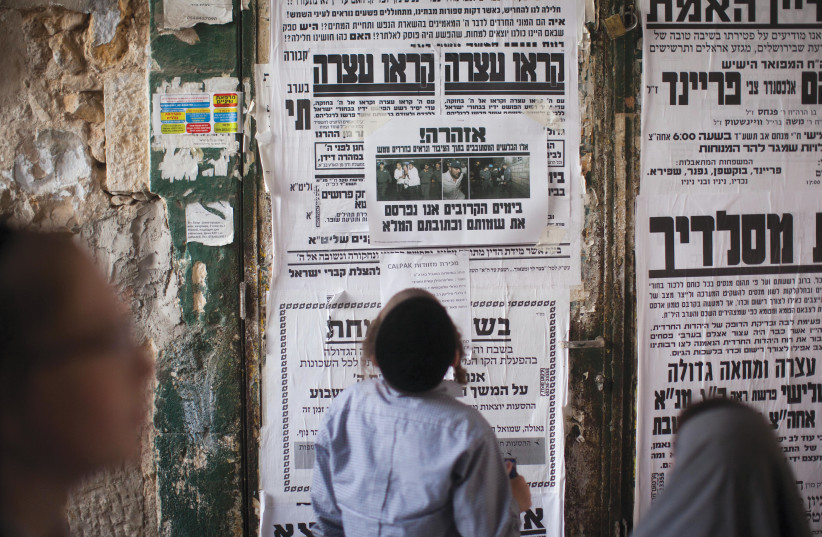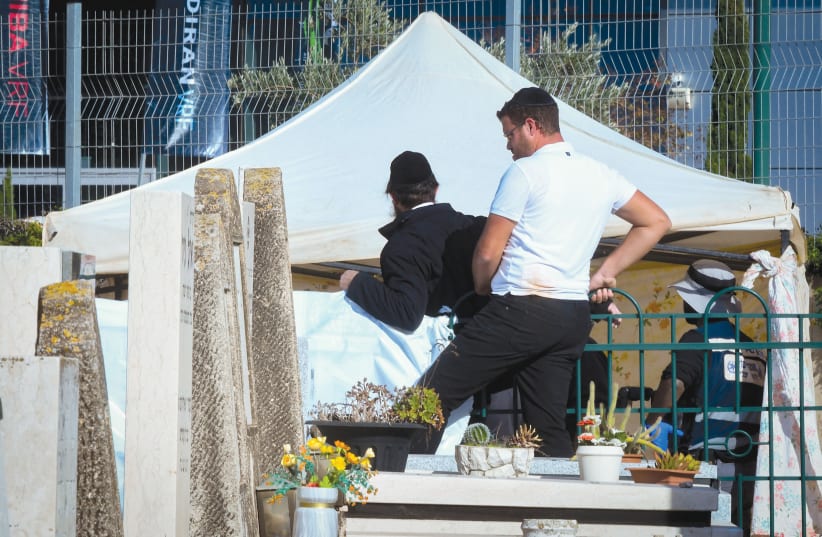Nothing prepared haredi society for the latest blow that befell it, with the outbreak of the Walder affair.
After absorbing that their representatives had not been added to the new government, that important committees in the Knesset had left their control, that the rabbinical authority was undermined as a result of embarrassment caused by the pandemic, came one disaster after another: Meron and the Karlin Hassidim bleacher collapse in Givat Ze’ev. By then, the feeling among many haredim was that it could not get worse.
Next came an investigation in Haaretz, with disturbing allegations about the behavior of one of the cultural heroes of Israel’s haredi community, beloved children’s book author Chaim Walder. This time the blow was unbearable.
This story differed from that of ZAKA’s Yehuda Meshi-Zahav, whose name was also linked to an investigation on sexual affairs in the same newspaper about a year ago. Though Meshi-Zahav was a celebrity in the secular public, he was not particularly popular among the ultra-Orthodox.
Walder was a completely different story. He was an educator, a successful writer, wrote a column in the haredi press and also had a radio program. Walder shaped – alongside a Torah lifestyle – the cultural horizon of so many, especially youth.

The astonishment at the news was soon replaced by embarrassment, anxiety and, perhaps, shame. Very quickly all of these were pushed aside by many – rabbis and public figures as well as ordinary haredim.
A mood took over: a perception that haredim were the object of persecution, accompanied by threats to their way of life as a separate society. It took almost two weeks until some change occurred among some parts of the sector – which, for now, still doesn’t represent all its factions.
Amid all the drama, In Jerusalem looks at the voices representing different parts of haredi society in the city. Some focus on the injustice done to this public while others foresee profound changes that can no longer be stopped. All agree on one critical point: in the haredi public, no one knows how to talk about sexuality – and certainly not to young children.
MOSHE LEFKOVITCH, an Alexander hassid who founded and manages an association helping youth from oleh families that immigrated from the former Soviet Union and Ethiopia, says the crisis is profound. ”Many people feel great pain and frustration. Parents of children are particularly apprehensive now. This affair makes them suspicious of everyone, they check on everyone around them in anxiety. There is no more trust in anyone.”
Lefkovitch adds that there is a distinction between average families and the atmosphere among the younger generation, those at different levels of openness to general society. In the WhatsApp groups of haredi young adults, Lefkovitch says one finds great criticism of rabbis who did not sufficiently distance themselves from Walder after the accusations were revealed. “There is a feeling that they knew and kept quiet and even after it became known they did not shake [it] off immediately, and that adds to the growing sense that perhaps the rabbis do not deserve the absolute trust they have – until recently – gained.”
“But,” adds Lefkovitch, “let’s not forget that for the large majority among the different factions of the haredi society, there is very little – if any – awareness of these events. These people live totally disconnected from the media – they don’t listen to non-haredi radio, they don’t watch TV, they don’t read newspapers – just a few glances at the haredi press – and hence they know very little of what is going on outside their closed world, and those are still the majority.
“But there is more,” adds Lefkovitch. “All these affairs broke out through a newspaper that is not particularly known for its affection for the haredi public. We do not have, in the haredi sector, a body like the Takana [Forum], which is perceived as a neutral and professional body that is not moved by hatred of religion.
“The general feeling is that haredim are hated, despised, suspected of all crimes and thus, the accusations toward such a significant figure like Walder shouldn’t be taken too seriously immediately. There is a feeling among many that it comes from bodies whose goal is not to fix but to blacken the entire haredi sector, so that even if one accepts that there is something to the story about Walder, perhaps some stories have been piled onto him because he was haredi.”
Regarding any eventual changes in the way haredi parents address their children about such dangers, Lefkovitch says the major problem is that within this society, there are things and words that will never be mentioned in a talk between father and son, mother and daughter. “They will not talk about these issues openly. They will say for example, do not talk with a stranger, do not get in the car of someone you don’t know, but they will not even hint at sexual issues. So finally, protest and talk about what exactly happened is done only in secular media.”
As for the reactions in the streets, Lefkovitch confirms that here again, embarrassment and lack of clarity reign: “There were struggles over whether to throw away his [Walder’s] books. There was a group who burned the books on the street, while others claimed it is precisely in the books that his better expressions remain.”
PNINA PFEUFFER is a leading figure in haredi feminism; a columnist; a former coordinator for Darkenu, the haredi moderate majority; and a mother of two. Today, Pfeuffer is CEO of the New Haredim (or Israeli Haredim) and she knows a lot about the tensions between haredi feminism and ultra-Orthodoxy, and the new opportunities opened up by social media for dialogue across political and gender divides.
“We are a kind of umbrella for all the haredi activists who want to make a policy change,” she explains, “because we want to bring change while we are all still part of the haredi world. But we want the change to come from the bottom, and we are all mobilized for this thing while maintaining an ultra-Orthodox lifestyle.
“The problem is that our political parties are very inaccessible, we have no way of making our voices heard – it’s all [what] the rabbis says, so everyone does what they say and we are left with no [input].”
Pfeuffer notes that in the recent case of Walder, it was reaching a point where they all needed to act. “The use of the defamation claim came to silence the victims,” she points out, adding that there were different reactions among her friends at New Haredim. Besides using social media, there were a few cases in which there was no alternative than to go to the rabbis and try to explain the situation on the ground, about which they apparently were not aware.
“In this event, some of us did go to the rabbis,” says Pfeuffer, “because obviously there was a feeling that one must respond against the words of the rabbis who tried to cover [up for] Walder at first, so we went to them with some of the victims who told them about the sexual abuse.” Pfeuffer, like many other haredim, had to find ways to explain to them about sexual harassment, “since in these issues they think like decades ago – and of course, there are terms and issues we don’t talk about openly in our society.”
There were myriad other problems to face – “for example, a rabbi will speak in front of 100 students in some neighborhood here, and the following morning, guys in Mexico will respond to this and there is no more control. But that rabbi, and so many others, just doesn’t understand how it works now [in the Internet era]. Their ambiguities are unclear and they do not know that he is already talking to the whole world and not [just] to the guys he has met [in person] – there is a great lack of understanding.”
At the beginning, Pfeuffer believes it may have been hard to believe how serious it was and it took the rabbis a while. But, Pfeuffer adds, “in haredi society there is no talk about sexuality and suddenly there was a topic they did not know how to talk about nor handle. This was the reason that at first it was not explained in the haredi press.” Walder’s death was not initially explained in the context of the alleged crimes attributed to him, as they did not know how to express it.
But Pfeuffer says that after a week, the Kikar HaShabbat website changed direction: “They realized they could not continue like this; these are people who were his friends but understood it was no longer possible.”
Pfeuffer concludes that considering the challenges of addressing sexuality and sexual crimes in haredi society, there is no other way and hence, “regardless of haredi public opinion, probably the most effective way today to deal with such offenders is through the media. Communication is a very important tool and despite the fear of witch hunts, serious newspapers ensure that things are examined in depth.”
While their stands differ, both Lefkovitch and Pfeuffer believe that times are indeed changing and the days when haredim would simply blindly obey anything rabbis say are over. How far that trend will continue remains a question with no clear answer. Lefkovitch is adamant that as long as haredim sense hatred, there will be a long way to go.
This is the sixth in a series on the different groups comprising Jerusalem’s haredi sector.
